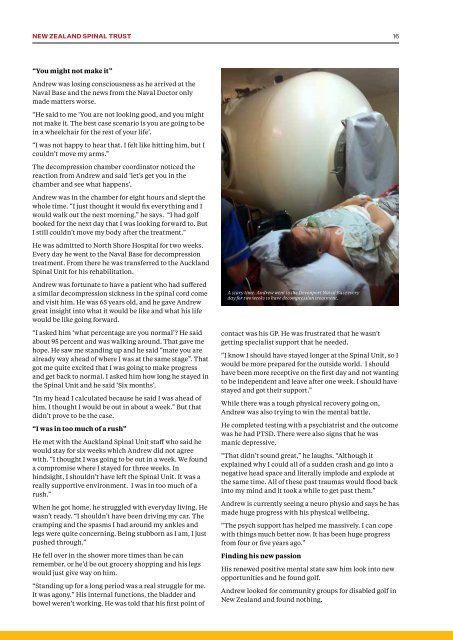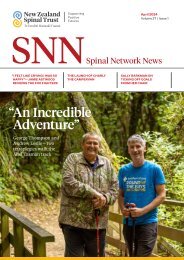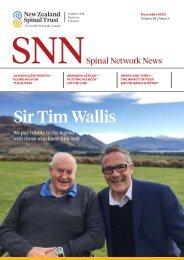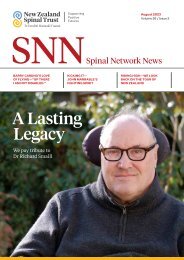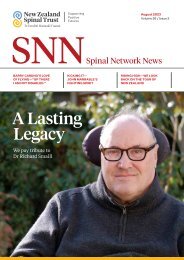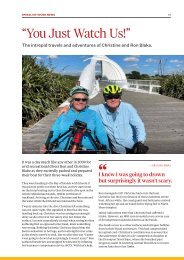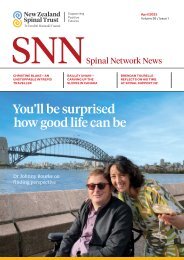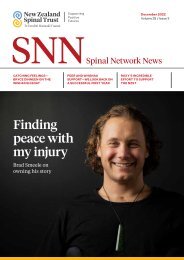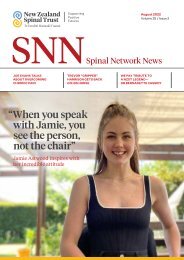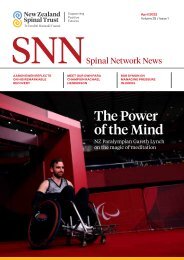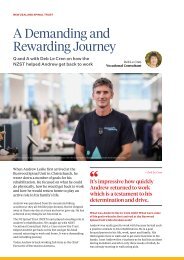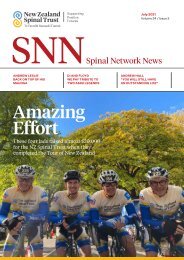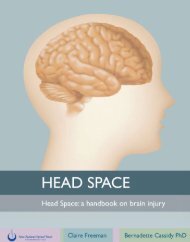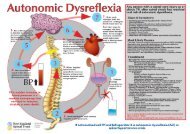Create successful ePaper yourself
Turn your PDF publications into a flip-book with our unique Google optimized e-Paper software.
NEW ZEALAND SPINAL TRUST 16<br />
“You might not make it”<br />
Andrew was losing consciousness as he arrived at the<br />
Naval Base and the news from the Naval Doctor only<br />
made matters worse.<br />
“He said to me ‘You are not looking good, and you might<br />
not make it. The best case scenario is you are going to be<br />
in a wheelchair for the <strong>res</strong>t of your life’.<br />
“I was not happy to hear that. I felt like hitting him, but I<br />
couldn’t move my arms.”<br />
The decomp<strong>res</strong>sion chamber coordinator noticed the<br />
reaction from Andrew and said ‘let’s get you in the<br />
chamber and see what happens’.<br />
Andrew was in the chamber for eight hours and slept the<br />
whole time. “I just thought it would fix everything and I<br />
would walk out the next morning,” he says. “I had golf<br />
booked for the next day that I was looking forward to. But<br />
I still couldn’t move my body after the treatment.”<br />
He was admitted to North Shore Hospital for two weeks.<br />
Every day he went to the Naval Base for decomp<strong>res</strong>sion<br />
treatment. From there he was transferred to the Auckland<br />
Spinal Unit for his rehabilitation.<br />
Andrew was fortunate to have a patient who had suffered<br />
a similar decomp<strong>res</strong>sion sickness in the spinal cord come<br />
and visit him. He was 65 years old, and he gave Andrew<br />
great insight into what it would be like and what his life<br />
would be like going forward.<br />
“I asked him ‘what percentage are you normal’? He said<br />
about 95 percent and was walking around. That gave me<br />
hope. He saw me standing up and he said “mate you are<br />
already way ahead of where I was at the same stage”. That<br />
got me quite excited that I was going to make prog<strong>res</strong>s<br />
and get back to normal. I asked him how long he stayed in<br />
the Spinal Unit and he said ‘Six months’.<br />
“In my head I calculated because he said I was ahead of<br />
him, I thought I would be out in about a week.” But that<br />
didn’t prove to be the case.<br />
“I was in too much of a rush”<br />
He met with the Auckland Spinal Unit staff who said he<br />
would stay for six weeks which Andrew did not agree<br />
with. “I thought I was going to be out in a week. We found<br />
a compromise where I stayed for three weeks. In<br />
hindsight, I shouldn’t have left the Spinal Unit. It was a<br />
really supportive environment. I was in too much of a<br />
rush.”<br />
When he got home, he struggled with everyday living. He<br />
wasn’t ready. “I shouldn’t have been driving my car. The<br />
cramping and the spasms I had around my ankles and<br />
legs were quite concerning. Being stubborn as I am, I just<br />
pushed through.”<br />
He fell over in the shower more times than he can<br />
remember, or he’d be out grocery shopping and his legs<br />
would just give way on him.<br />
“Standing up for a long period was a real struggle for me.<br />
It was agony.” His internal functions, the bladder and<br />
bowel weren’t working. He was told that his first point of<br />
A scary time. Andrew went to the Devonport Naval Base every<br />
day for two weeks to have decomp<strong>res</strong>sion treatment.<br />
contact was his GP. He was frustrated that he wasn’t<br />
getting specialist support that he needed.<br />
“I know I should have stayed longer at the Spinal Unit, so I<br />
would be more prepared for the outside world. I should<br />
have been more receptive on the first day and not wanting<br />
to be independent and leave after one week. I should have<br />
stayed and got their support.”<br />
While there was a tough physical recovery going on,<br />
Andrew was also trying to win the mental battle.<br />
He completed testing with a psychiatrist and the outcome<br />
was he had PTSD. There were also signs that he was<br />
manic dep<strong>res</strong>sive.<br />
“That didn’t sound great,” he laughs. “Although it<br />
explained why I could all of a sudden crash and go into a<br />
negative head space and literally implode and explode at<br />
the same time. All of these past traumas would flood back<br />
into my mind and it took a while to get past them.”<br />
Andrew is currently seeing a neuro physio and says he has<br />
made huge prog<strong>res</strong>s with his physical wellbeing.<br />
“The psych support has helped me massively. I can cope<br />
with things much better now. It has been huge prog<strong>res</strong>s<br />
from four or five years ago.”<br />
Finding his new passion<br />
His renewed positive mental state saw him look into new<br />
opportunities and he found golf.<br />
Andrew looked for community groups for disabled golf in<br />
New Zealand and found nothing.


